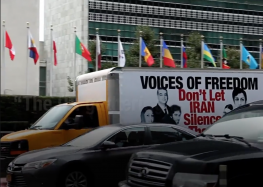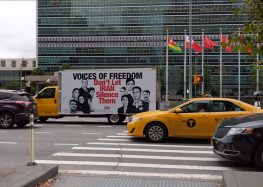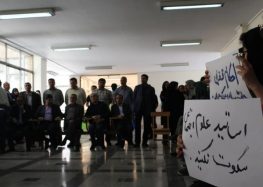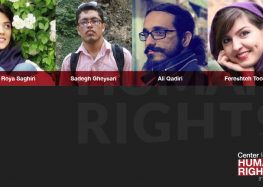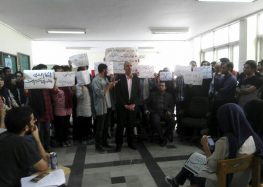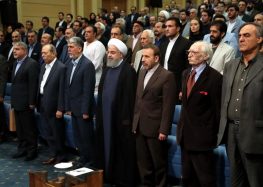Ninety-two Student Groups in Iran Criticize Rouhani for Unfulfilled Promises
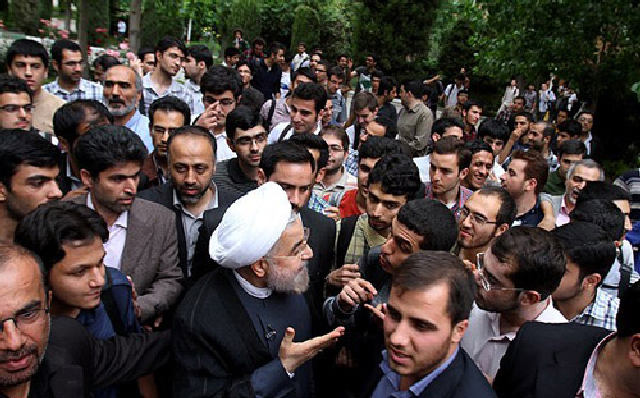
Ninety-two university student groups have issued a joint letter to President Hassan Rouhani criticizing the persistent “atmosphere of fear and intimidation” in Iran’s universities following a spate of attacks and sabotage against peaceful student activities.
“Programs organized by students with permission from the Ministry of Science are canceled without reason, including gatherings designed to bring harmony among various student organizations, and there have been unlawful interferences in the agenda of student programs that have ultimately resulted in delays or suspensions,” said the letter, published on July 27, 2016.
“After Rouhani came to power, students hoped that they would be able to carry out certain activities,” former student activist Salman Sima told the International Campaign for Human Rights in Iran. “But this letter shows that students don’t share Rouhani’s feelings [that things have improved]. Their hope has turned to despair.”
Sima, who was imprisoned in Iran for his activism and now resides in Canada, said he believes students wrote the letter to Rouhani because of the growing influence of conservatives and other hardliners in university affairs, including local Friday prayer leaders appointed by Ali Khamenei, the supreme leader.
“One of the problems faced by students in recent years has been the surveillance of their online activities,” he said. “Their Instagram and Facebook accounts are monitored [by security agents] to see if, for instance, they attended a party in their free time and then a case is made against them. Meanwhile, the universities’ own code of conduct allows for students to be monitored only while they’re on campus, not outside.”
Reminding Rouhani of his presidential campaign pledge to bring more openness and freedoms to campuses, the letter also complained of the Judiciary’s refusal to investigate the interferences.
The students also noted that hardliners were creating roadblocks for student groups by reducing their operational budgets, vetting and arbitrarily rejecting guests invited to student conferences, monitoring posts and intimidating students on social media, and expanding existing gender segregation policies.
During his 2013 presidential campaign Rouhani addressed several student events and promised to end the “security atmosphere” in universities, reinstate students and academics expelled for political reasons, and prevent the segregation of male and female students.
In a speech marking Iran’s Student Day on December 7, 2015, Rouhani claimed that the climate had improved since his election. “I don’t like that there still might be a security atmosphere in the universities,” he said. “But I feel that the difference between the climate now and the one in 2013 is like night and day.”
The dozens of student organizations who signed the letter to Rouhani expressed a different opinion.
Hardliners Call the Shots
Soon after Rouhani’s election, Khamenei emphasized that his own vision for universities was nowhere near as open or liberal as that of Iran’s new president.
In a speech on July 3, 2014, Khamenei called on chancellors to prevent political activities, which he called a “deadly poison” against learning, from occurring on campus. His speech coincided with a debate in Parliament that led to the impeachment of the reformist minister of science, research and technology, Reza Faraji-Dana, who had appointed more open-minded chancellors at a number of universities and reinstated expelled student activists.
Rouhani has publicly encouraged students to become more involved in politics, even saying once that “the university is the best place to criticize power.” But his words have rung hollow against the growing power and influence of conservative hardliners in universities.
“Students have to get a permit from the Monitoring Committee every time they want to organize an event, but the committee is made up of hardliners from the establishment, namely the Student Basij Organization, which controls everything,” Sima told the Campaign. (The basij is a voluntary militia under the authority of Iran’s Revolutionary Guards.) “In some cities, Friday prayer leaders openly interfere in university affairs by exerting enormous influence. They easily disrupt student events by making speeches [that incite their followers into action].”
“Experience has shown that President Rouhani, despite all his promises, does not have the will to change the security atmosphere in universities,” he added. “He has been more focused on removing international pressures on Iran than on opening up the atmosphere in universities.”

